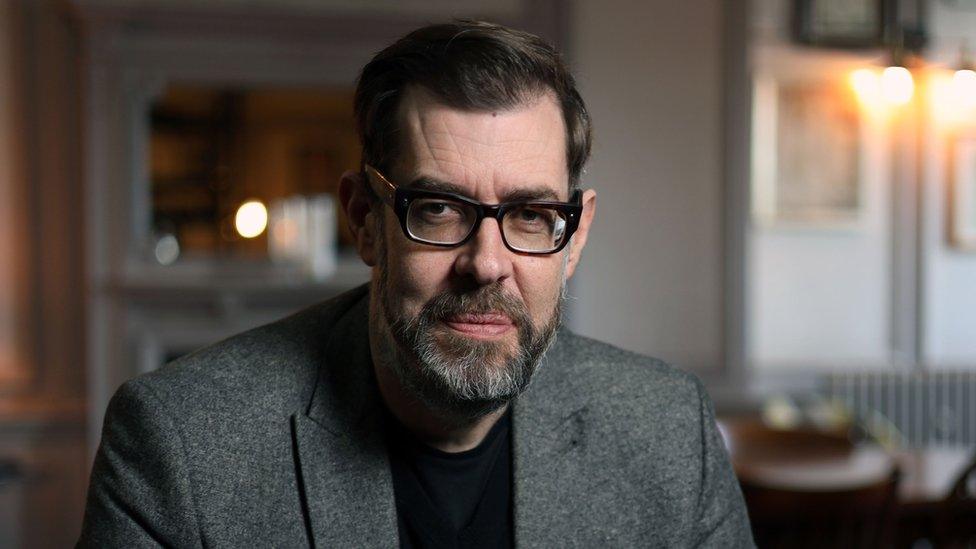Richard Osman: I'm terrible at playing detective
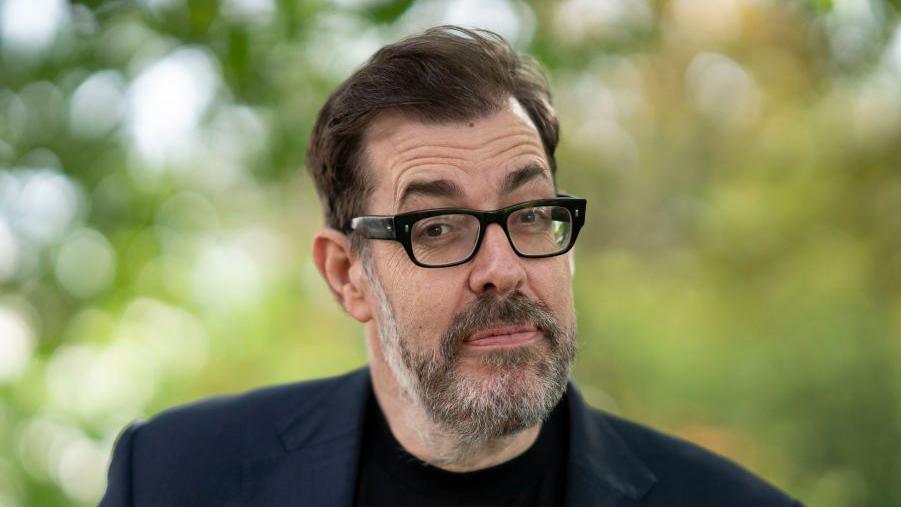
Osman has published his first book in a new series, We Solve Murders
- Published
In just four years, Richard Osman has transformed himself from a TV presenter and producer into a best-selling author.
But despite having a knack for writing cosy crime, he admits to the BBC he is "terrible at playing detective".
"My grandfather solved crimes for a living and my mum would watch any Sunday night crime drama, and within five minutes know who done it.
"I think I'm brilliant but I'm always wrong. My wife and I think we know who did it and then at the end we both don't get it right," Osman says.
His hugely popular Thursday Murder Club mystery novels follow a group of elderly amateur sleuths living in a peaceful retirement village. The first book has already been snapped up by director Steven Spielberg, who is producing an adaptation for Netflix.
Osman has now turned his attention to a new crime series.
We Solve Murders, sees Steve and Amy, a retired ex-cop and his bodyguard daughter-in-law, jet set across the world to solve a string of murders.
But the crime-busting duo couldn't be more different.
"Steve’s an ex-cop who just wants a quiet life, but he’s reluctantly dragged into this adventure by Amy, who’s got this energy and drive that pulls him along," explains Osman.
While most people's relationship with their in-laws is civil at best, Osman wanted to turn the stereotype on its head and explore the idea of found families.
"I find the idea very moving," Osman says. "I wanted to bring together two people who wouldn't naturally cross paths like Steve and Amy. They're an unlikely pair, but their relationship is filled with love and respect."
Although the backdrops of private jets and luxurious destinations is a marked difference from the quaint Kent village setting of his first crime series, Osman says the book has the same "warmth and type of characters".
'Found a use for ChatGPT'
One of the most humorous elements in Osman’s latest novel involves the use of AI, with the murderer concealing his identity by asking ChatGPT to write his emails in the style of a friendly English gentleman.
"I have finally found a good use for ChatGPT, because I don't think there's been one before," Osman says.
Despite pretending to use it in his books, Osman hasn't been tempted to see if it can help him write his next novel.
"It can certainly help you write a letter to your electricity company, but I'm sure it definitely can't write a book - it's so flat."
He doesn't worry about AI replacing roles in the arts as he says: "AI is not going to write Succession anytime soon, or a Kate Atkinson novel. There's always going to be room for great culture that comes from the human heart rather than a machine's head."
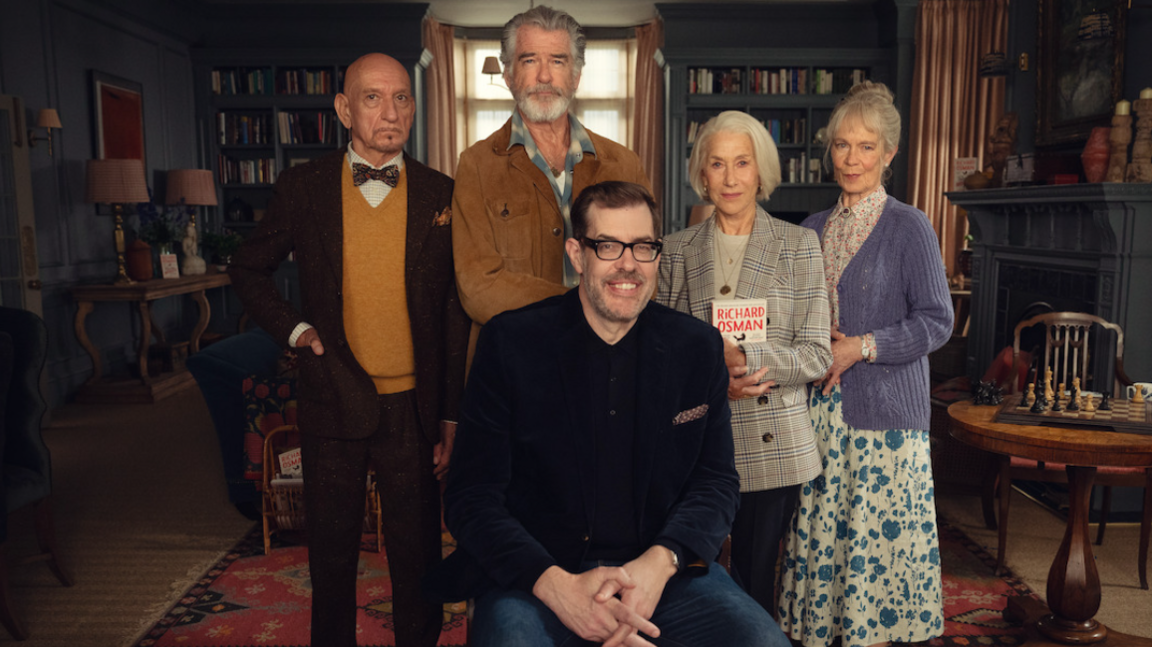
Richard Osman on the set of The Thursday Murder Club with cast Sir Ben Kingsley, Pierce Brosnan, Dame Helen Mirren and Celia Imrie
In his new novel, Osman also touches on the world of social media influencers.
The murderer's victims are influencers - the kind flogging vitamin drinks and lip fillers in the search of fame and money, which Osman says makes them the perfect character.
"I was reading that influencers were being used to smuggle things because no one questions why they're going to Dubai or the Cayman Islands all the time with either no luggage, or lots of it.
"They spend their lives travelling around the world but actually if you look behind the curtain, they don't have any money so they are the perfect people to abuse if you're a criminal gang because you can always take advantage of someone like that."
But Osman says there's another side to the influencer lifestyle, one that can help those from less privileged backgrounds break into the media industry.
"If you're a young working-class kid and you've got talent, there's an avenue to money that didn't used to exist," he explains.
"Social media has given working-class talent a way to bypass the traditional gatekeepers of television."
Osman says there were barely any working-class people in the TV industry when he joined and "even fewer people now".
He was fortunate to have attended university on a scholarship and received housing benefits to move to London, so he was able to take a low-paid job in the industry, but in today's world "I would not be able to do what I do now".
"Traditional media industry is in such decline that there's not an awful lot it can do to help working-class kids get jobs," Osman explains.
Instead he says that young people are having "to do it by themselves and lean into the world of self-promotion".
While there's a buzz around his new book, Osman's fans are most excited about what's next in store for The Thursday Murder Club.
'Trust the process'
The book series has sold more than 10 million copies worldwide, and all four of the books in the series have broken UK sales records.
Osman is now in the process of writing the fifth book in the series - after spending time on the set of the upcoming film adaptation.
The Netflix film features a stellar cast including Helen Mirren, David Tennant and Pierce Brosnan, with Harry Potter director Chris Columbus calling the shots.
Osman says he is just as excited as his fans to watch it. "I go down on set and it's incredible, it feels like an absolute treat and I can't wait to see it."
He has also learnt to let go of any protectiveness he might feel around the story.
"You just have to give it all up and trust people," he says. "I take care of the books because that's what I'm good at, and I leave the film to the people who can do that."
"Nobody wants me looking over Spielberg's shoulder telling him what to do."

Osman has hosted TV shows Pointless and House of Games [pictured]
The Pointless and House of Games star has achieved immense success in TV and now also in the world of fiction writing, but he never allows himself to get complacent.
"Every bit of success is gravy but I just always think 'I need to go and write the next thing now.'"
And, what is next for the 53-year-old?
"The fifth Thursday Murder Club is out next September and I try to do a book a year, so then there'll be a second We Solve Murders after that and the series will sort of piggyback each other for the next few years.
"Unless, of course, it's a total disaster, in which case this book was always designed to be a one-off!"
Related topics
- Published27 August 2020
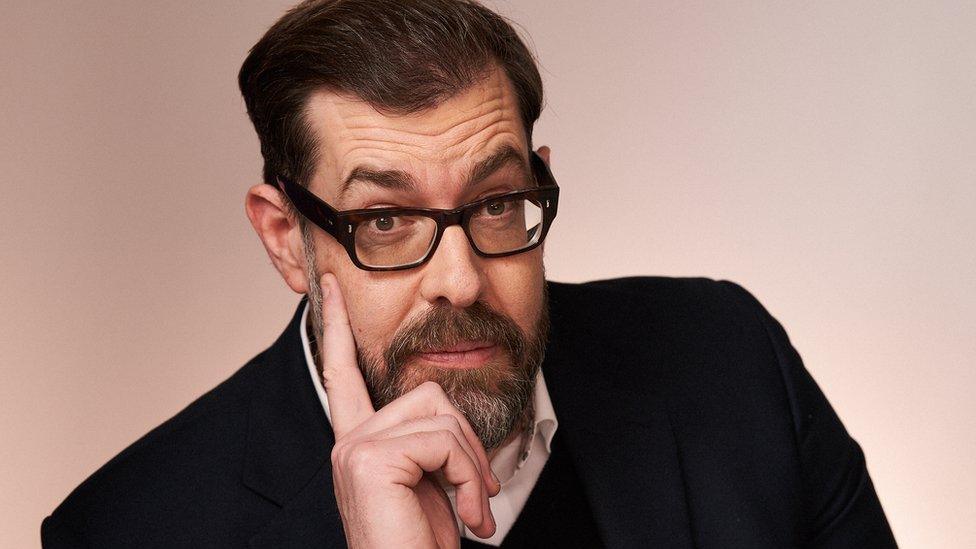
- Published13 May 2021
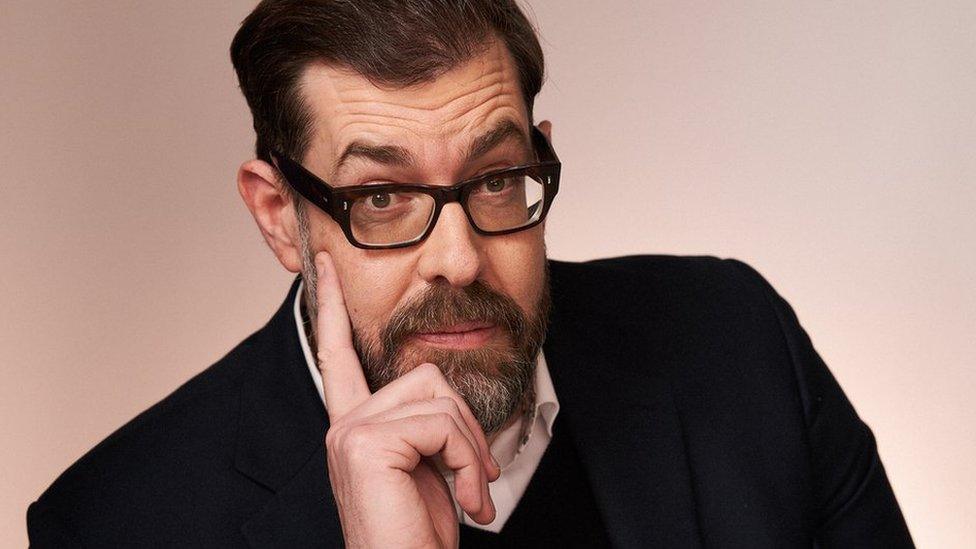
- Published13 September 2021
